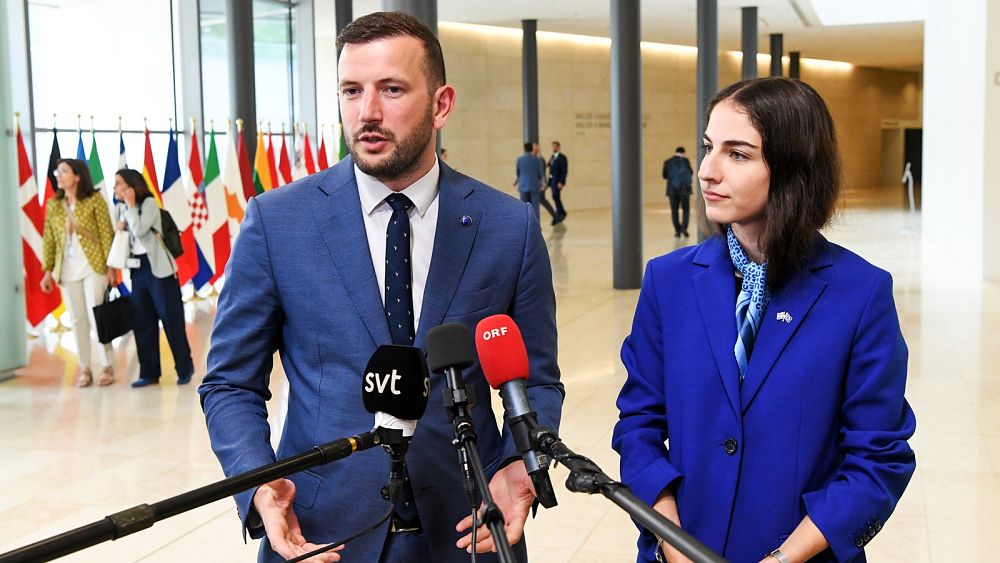World
EU countries vote to move forward with Nature Restoration Law

The Nature Restoration Law, which has attracted enormous controversy, was on Tuesday endorsed by EU member states.
Environment ministers voted to move forward with the draft piece of legislation, which seeks to reverse the European Union’s biodiversity loss by rehabilitating degraded land and sea areas.
Countries added flexibility to some of the targets the law seeks to introduce, including those related to green urban spaces and the rewetting of peatlands. They also underlined renewable projects would enjoy an “overriding public interest” and therefore be exempted from the non-deterioration obligation.
The clarifications secured the approval of the provisional agreement, which maintains the initial objective to restore at least 20% of the bloc’s land and sea areas by 2030.
The text, drafted by the Swedish presidency of the EU Council, is meant to guide negotiations with the European Parliament. It received 20 votes in favour, five against and two abstentions, a diplomat with knowledge of the talks told Euronews.
“We have listened carefully to all member states who had different concerns and remarks on the proposal,” said Romina Pourmokhtari, Sweden’s minister for the environment, at the end of the meeting in Luxembourg.
“Today’s deal shows the presidency has been able to find a good balance and also that member states have shown goodwill to compromise.”
Pourmokhtari said the objections put forward by some countries were “legitimate” but defended the compromise as being in line with the legislation’s overall ambitions. Her own country, Sweden, is believed to be opposed to the Nature Restoration Law due to the targets related to the management of forests.
“Today is a good day for nature,” Pourmokhtari declared.
Speaking by her side, Virginijus Sinkevičius, the European Commissioner for the environment, said it was also a “good day for the EU’s democracy” and argued the deal would allow the bloc to fulfil the international commitments reached last year at COP15 in Montreal.
“The Council clearly showed its will to invest political capital in nature,” Sinkevičius said. “Such constructive approach yielded results so it proved that when there is a political will, solutions can be found.”
Tuesday’s outcome offers the Nature Restoration Law a brief respite amid a furious fight in the European Parliament, where conservative parties have mounted a relentless campaign to bring down the text.
The centre-right European People’s Party (EPP), the largest formation in the hemicycle, has repeatedly attacked the proposal, claiming the legally-binding restoration targets will threaten the livelihoods of European farmers and fishers, disrupt supply chains, decrease food production and push prices up.
The claims have been contested by the European Commission, environmental NGOs and the private sector, which argue biodiversity loss and climate change are the two sides of the same coin and must be tackled at the same time.
Last week, the parliament’s environment committee (ENVI) held a high-stakes vote on the Nature Restoration Law that was seen as a trial of the European Green Deal.
During the vote, a motion filed by the EPP to reject the text in its entirety received 44 votes in favour and 44 against, meaning it did not pass by one single ballot. The committee then began voting on a huge list of amendments but MEPs ran out of time and chose to postpone the session.
The vote on the whole text will take place on 27 June. If the 44-44 margin is repeated, the committee will have to reject the law and send it to the plenary without any amendments, endangering its chances of success.
“The EPP Group will do whatever it can to stop these proposals from becoming law,” the group tweeted shortly after the Council’s meeting came to an end.
Asked about next week’s vote, Commissioner Sinkevičius urged lawmakers to “really look at the content” of the law in order to “bridge outstanding gaps.”
“I can only call on all parties to keep calm and negotiate,” Sinkevičius said, avoiding mentioning the EPP by name.
“This is the way how we usually get to the best possible conclusions, conclusions that are vital for our future and are enshrined in the nature restoration proposal.”

World
Italian state railways plans 1.3 bln euro investment in solar plant

World
Christmas in Puerto Rico is a 45-day celebration with caroling, festive decorations, family feasts and more

Christmas, Navidad in Puerto Rico, extends far beyond Dec. 25.
The island proudly proclaims itself as having the “longest holiday season in the world,” according to the website Discover Puerto Rico.
On average, the holiday festivities in Puerto Rico last about 45 days, per the source, commencing right after Thanksgiving, and stretching all the way through mid-January.
The Christmas season in Puerto Rico typically lasts around 45 days. (iStock)
HOW TO SAY ‘MERRY CHRISTMAS’ IN 10 LANGUAGES TO FRIENDS AROUND THE WORLD
The holiday season in Puerto Rico is full of rich traditions beloved by families.
One tradition those who visit Puerto Rico will immediately notice during the holiday season is decorations.
In Puerto Rico, decorations are typically put up by Thanksgiving, and kept up until the season concludes in mid-January, with opportune picture moments at every corner.
Parrandas, Christmas caroling, is a holiday staple.
17 SECRET TRAVEL TIPS FOR FALL AND WINTER THAT AREN’T SO SECRET AFTER ALL
Carolers choose houses of family and friends to visit, typically starting around 10 p.m., performing aguinaldos (traditional Christmas songs), with not only their voices, but often with instruments as well, according to Discover Puerto Rico.
The group you begin caroling with is likely not the same group you end with.
In Puerto Rico, when carolers visit a house, they’ll often stop inside for conversation, food and drink before moving to the next residence.

Coquito is a popular beverage enjoyed during the holiday season in Puerto Rico. Coconut, vanilla and rum are among the ingredients. (Mayra Beltran/Houston Chronicle via Getty Images)
Usually, the residences of the house visited will join the group for the next house, according to Discover Puerto Rico.
CHRISTMAS TREES IN GERMANY WERE DECORATED WITH APPLES INSTEAD OF ORNAMENTS IN THE 1600S FOR ‘ADAM AND EVE DAY’
A night of serenading loved ones can last quite a while, often stretching into the early morning hours of the following day, according to the source.
The biggest day of the holiday season in Puerto Rico actually isn’t Christmas, but instead, the night before.
In Puerto Rico, Dec. 24 is Nochebuena. On that day, loved ones gather for the exchange of gifts, caroling and a large feast.
Many families will also attend a midnight Mass on the day, known as Misa de Gallo.
FLIGHT ATTENDANTS REVEAL THE SURPRISING DAY TO TRAVEL AHEAD OF THE CHRISTMAS RUSH
After Christmas passes, the festivities go on in Puerto Rico.
Another big event in the holiday lineup is Three Kings Day on Jan. 6, a holiday that “commemorates the visit that the Three Wise Men paid to Jesus after his birth,” according to Discover Puerto Rico.
On the eve of the day, children fill up a shoebox with grass to be left for camels to munch on while the Three Kings leave behind gifts for them, according to PuertoRico.com.
For a particularly festive Three Kings Day, Juana Díaz is the place to go, as it hosts the largest celebration in Puerto Rico for the holiday. In Juana Díaz, there is an annual festival and parade in honor of Three Kings Day that brings together over 25,000 people every year, according to Discover Puerto Rico.

Gifts are primarily exchanged between loved ones on Christmas Eve in Puerto Rico. (iStock)
Then, eight days later is Octavitas, a post-holiday celebration where families get together and celebrate one last time for the season.
The end of the holiday season is marked with the San Sebastián Street Festival.
This festival, spanning over multiple days, takes place in Old San Juan, and is filled with live music, dancing, shopping and parades.
World
Small plane crashes into Brazil town popular with tourists, killing 10

Twin-engine plane crashed in largely residential neighborhood of Gramado shortly after takeoff, authorities say.
A small plane has crashed into a tourist hotspot in southern Brazil, killing all 10 people on board and injuring more than a dozen people on the ground, officials have said.
The twin-engine Piper PA-42-1000 hit the chimney of a home and the second floor of a different house before crashing into a shop in a largely residential neighbourhood of Gramado shortly after takeoff from Canela, Brazil’s Civil Defense agency said on Sunday.
Rio Grande do Sul Governor Eduardo Leite told a news conference that the aircraft’s owner and pilot, Luiz Claudio Galeazzi, was killed along with nine members of his family.
Leite said that 17 people on the ground were injured, 12 of whom were still receiving treatment in hospital.
Galeazzi’s company, Galeazzi & Associados, confirmed that its CEO and Galeazzi’s wife and three daughters had died in the crash.
“Luiz Galeazzi will be forever remembered for his dedication to his family and for his remarkable career as a leader of Galeazzi & Associados,” the company said in a post on LinkedIn.
“In this moment of immense pain, Galeazzi & Associados is deeply grateful for the expressions of solidarity and affection received from friends, colleagues and the community. We also sympathize with all those affected by the accident in the region.”
Gramado, located in the Serra Gaucha mountains, is a popular destination for vacationers, especially during the Christmas season.
The crash comes a little more than a year after Brazil suffered its worst air disaster in nearly two decades when a twin-engine plane crashed in the southeastern city of Vinhedo, killing all 62 people on board.
-

 Politics1 week ago
Politics1 week agoCanadian premier threatens to cut off energy imports to US if Trump imposes tariff on country
-
/cdn.vox-cdn.com/uploads/chorus_asset/file/25789444/1258459915.jpg)
/cdn.vox-cdn.com/uploads/chorus_asset/file/25789444/1258459915.jpg) Technology1 week ago
Technology1 week agoOpenAI cofounder Ilya Sutskever says the way AI is built is about to change
-

 Politics1 week ago
Politics1 week agoU.S. Supreme Court will decide if oil industry may sue to block California's zero-emissions goal
-
/cdn.vox-cdn.com/uploads/chorus_asset/file/25546252/STK169_Mark_Zuckerburg_CVIRGINIA_D.jpg)
/cdn.vox-cdn.com/uploads/chorus_asset/file/25546252/STK169_Mark_Zuckerburg_CVIRGINIA_D.jpg) Technology1 week ago
Technology1 week agoMeta asks the US government to block OpenAI’s switch to a for-profit
-

 Business1 week ago
Business1 week agoFreddie Freeman's World Series walk-off grand slam baseball sells at auction for $1.56 million
-
/cdn.vox-cdn.com/uploads/chorus_asset/file/23951353/STK043_VRG_Illo_N_Barclay_3_Meta.jpg)
/cdn.vox-cdn.com/uploads/chorus_asset/file/23951353/STK043_VRG_Illo_N_Barclay_3_Meta.jpg) Technology1 week ago
Technology1 week agoMeta’s Instagram boss: who posted something matters more in the AI age
-
News1 week ago
East’s wintry mix could make travel dicey. And yes, that was a tornado in Calif.
-
/cdn.vox-cdn.com/uploads/chorus_asset/file/24924653/236780_Google_AntiTrust_Trial_Custom_Art_CVirginia__0003_1.png)
/cdn.vox-cdn.com/uploads/chorus_asset/file/24924653/236780_Google_AntiTrust_Trial_Custom_Art_CVirginia__0003_1.png) Technology2 days ago
Technology2 days agoGoogle’s counteroffer to the government trying to break it up is unbundling Android apps



















